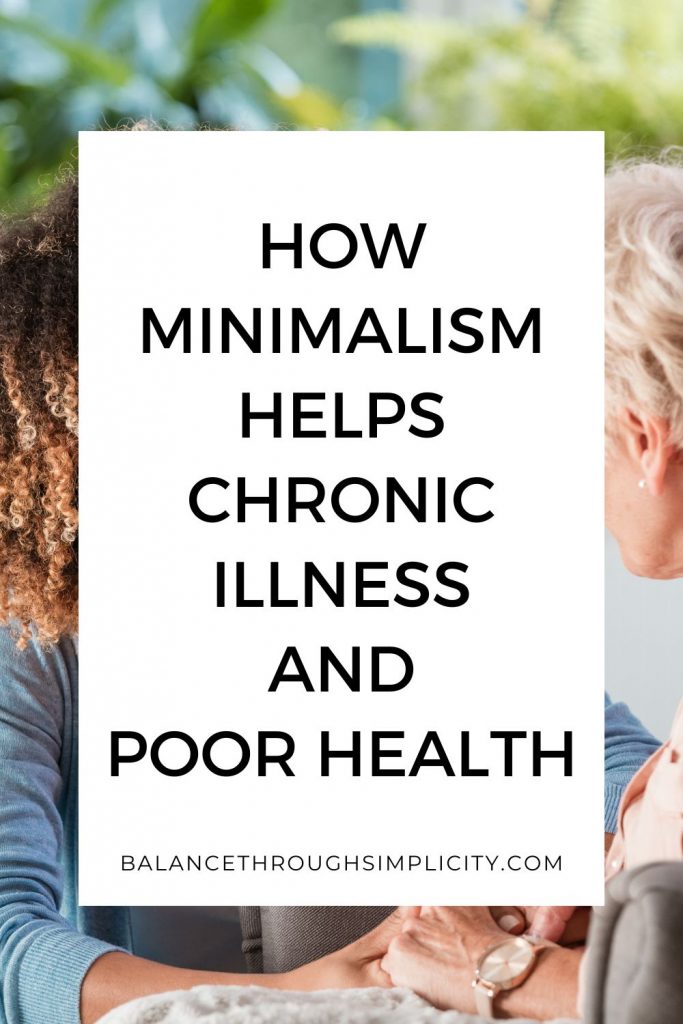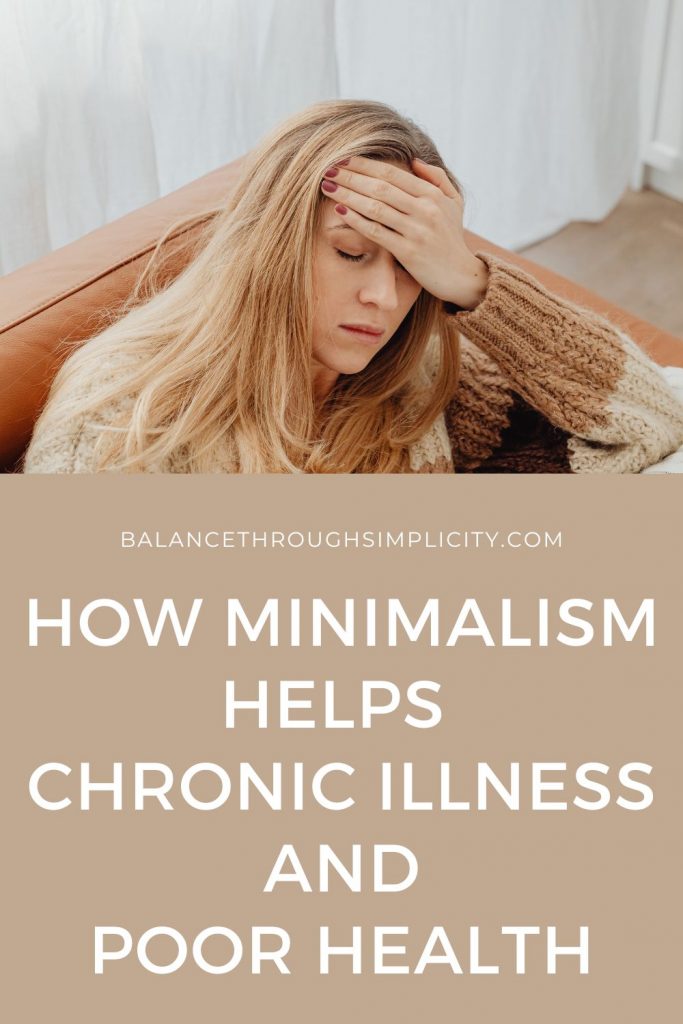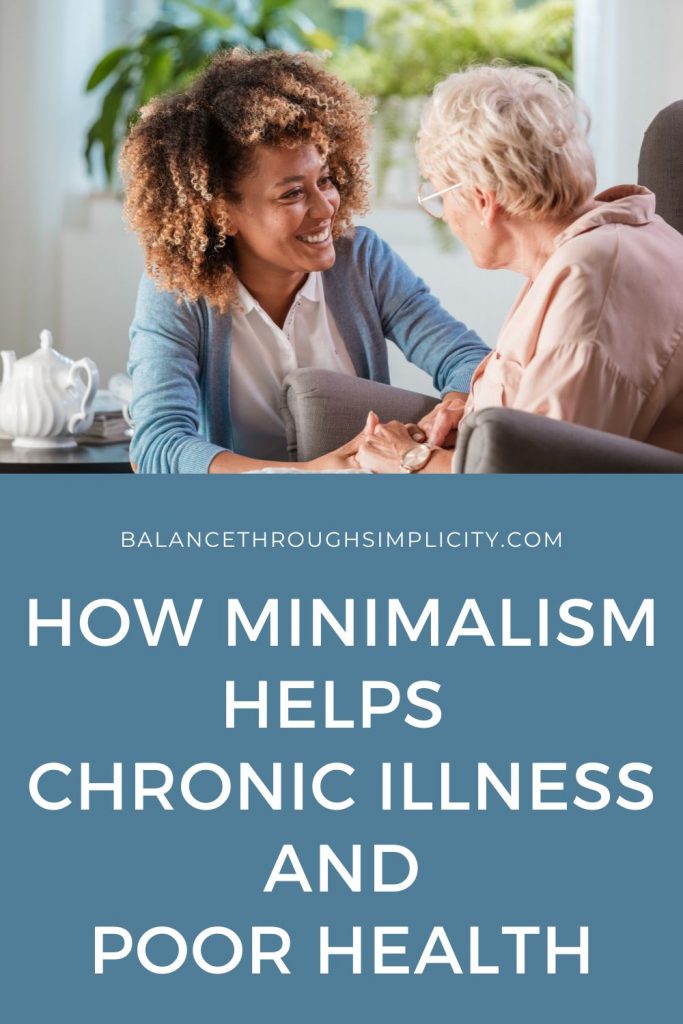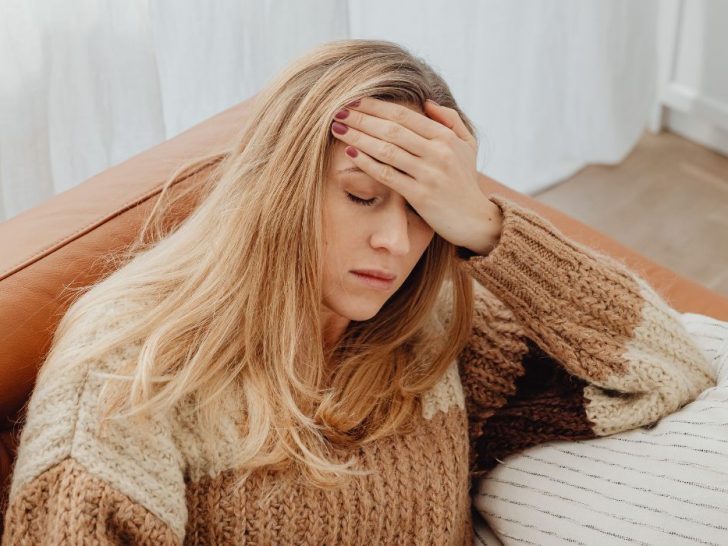HOW MINIMALISM HELPS CHRONIC ILLNESS & POOR HEALTH
The minimalist lifestyle helps simplify our lives in many ways. In this article I explore some personal ideas around the benefits of minimalism if you’re suffering from poor health and how minimalism helps chronic illness sufferers and their loved ones and carers.
MY PERSONAL EXPERIENCE OF POOR HEALTH AND ILLNESS
I’ve been meaning to write this article for months now but every time I put pen to paper (finger to keyboard actually) I’ve put it off. Regular readers might know that I lost my mum last year. She was poorly for years but her passing was still sudden and unexpected.
I struggled with her loss, obviously, and the challenges of supporting her through the other significant and increasing health problems that she experienced in the months before. I was worried about her health but it also triggered a strong return of my own mental health issues around anxiety and depression.
I was juggling caring for her, holding down a full-time job, the difficulties of fluctuating hormones in my own midlife body as well as dealing with those of my teenager and nearly teenager (!) and managing my home and this blog.
The combination of these turbulent months of physical and mental health issues took its toll but I suspect it would have been far, far more difficult had it not been for my simplified, decluttered and minimalist lifestyle. It reinforced why I chose to be a minimalist in the first place, to simplify life to help me cope with life’s inevitable ups and downs.
A QUICK RECAP ON THE MINIMALIST LIFESTYLE
Minimalism is a lifestyle that encourages us to be mindful and intentional about the stuff in our life. Whether that’s the stuff in our homes, our schedule, our mind, our financial situation, our daily routine and so much more. Keep the meaningful and what adds value, get rid or let go of the empty padding and clutter with which we fill our home, schedule, heart and mind and make decisions every day to live in alignment with our priorities and the things that really matter to us.
Minimalism is about balance and giving yourself time, space and energy with less stress and less demands on your precious personal resources.
As you read this article (and other articles on my blog), if you feel put off by the term ‘minimalist’ you could swap it for decluttered or simplified if that feels gentler and less cold. Whichever label you prefer to use, the message is the same. To have less clutter and more life.
CHRONIC ILLNESS AND POOR HEALTH
Our health is important. We have one body and mind and we need these to carry us through life as well as they can for as long as possible. If our body and mind aren’t functioning as well as they can, life can feel very tough.
Depending on when and what your diagnosis is, you might worry about the future and what to expect. You might be coming to terms with a difficult prognosis, symptoms, treatments and a life that’s not turning out as you hoped or expected. Your loved ones might also be doing the same as they support you too.
Living with a chronic illness requires adjustment, a shift in mindset, dealing with a whole host of practical problems and probably putting in place habits and routines to help you manage through the days. Life can get turned upside down and you might have to learn to live again, in a new way.
If you struggle with a long-term or chronic physical or mental health condition, I hope that some of the ideas I’m sharing here resonate with you. I encourage you to consider simplifying your home and life in whatever way is possible to feel some of the benefits of minimalism in relation to your health and wellbeing.

HOW MINIMALISM HELPS CHRONIC ILLNESS AND POOR HEALTH
Here are just a few ways, from my own experience, that minimalism helps chronic illness and poor health. Maybe you have experience of others?
1. A home that’s easier to look after
Minimalism encourages us to get rid of excess clutter in our homes. Random clutter, things we don’t use, need, appreciate or add value in some way, even furniture that we don’t have a purpose for. Having less stuff means that your home is easier and quicker to clean. So, if you have limited energy, mobility or time when you’re feeling up to cleaning then it’s a real benefit to spend less time cleaning, especially when you have challenging symptoms and you’re out of action for periods of time. You might even find these tips on how to detox your home of interest.
2. A home that’s more accessible
Some health conditions come with mobility problems and you may require a wheelchair or other equipment to help you move around your home safely and as independently as possible. Having less clutter and perhaps less furniture (or more of the furniture that suits your physical requirements) might help you maximise space and ease of access.
3. A home that’s more calm and peaceful
Coping with illness is hard work. You might be stressed, tired, angry, frustrated, worn out, in pain, depressed and a myriad other emotions (in addition to pain and other physical effects). A home that’s calm and peaceful will help soothe difficult emotions and give you quiet and calm when you need it most. This can also be helpful for some of the gentle practices we’re encouraged to use to soothe the body and brain such as meditation, mindfulness and getting rest and sleep whenever we can and need to.
4. A home that’s less stressful
My mum was a minimalist before it was really ever a thing and she naturally preferred simple lines and spaces. However, when she married my dad (a hoarder) her home became full of stuff. After he died, she spent a long time decluttering and had nearly finished by the time she became too ill to do this anymore. She spent a while worrying about the stuff that she hadn’t got round to dealing with, and although I assured her not to worry, she mentioned it regularly.
A home with less stuff and that’s less of a burden is a home that’s less stressful and weighs less on your mind. You don’t need stress like that anymore than you need the clutter. Research studies have also shown that clutter is bad for our brains. A cluttered environment contributes to increased levels of cortisol, your body’s primary stress hormone, so decluttering your home can reduce stress levels.
5. A home that’s more organised
A minimalist home has less stuff and when you have less stuff, it’s easier to organise and keep what you do have tidy. If you need to find any equipment or medication then knowing where it is and being able to access it easily is going to save you time, effort and stress.
6. A home that gives you more time for what matters
Time waits for no-one and if you’re struggling with physical or mental health problems, time is precious. Take advantage of when you’re feeling as good as you can to live life on your terms doing things that make you feel better. A minimalist home frees up your time for doing more of what you enjoy because you won’t be needing to tidy, clean or worry about your stuff and what’s in it. You’ll also have more time for medical appointments if and when you need them.

7. A home that functions as you need it to
In some cases, you might need to adapt your space or change your home around to suit your needs. If climbing stairs isn’t an option, you might decide to move your bedroom downstairs. A simplified, decluttered home has much more flexibility for your changing needs as there’s more space, less clutter and less to move and clear. You can make your home work for you and your needs, short or long term.
8. A home that welcomes visitors
If you’re housebound you might have family and friends come to visit you. If you’re unable to dedicate much time or energy to cleaning and tidying then worrying about the state of your home and whether it’s presentable to guests can add to your stress. A minimalist home is much easier to keep tidy and clear with next to no effort so much more likely to be guest-ready whenever you need it to be!
9. A home that encourages enjoyable activities on your terms
Sometimes you might feel better than others and ready to read a book, paint, sew or explore another hobby. The last thing you probably want to do is waste time looking for your paints, sewing materials or searching for that book you wanted to read. A minimalist home is more likely to be tidy, organised and have space for you to do whatever hobby you feel like, when you feel like it. No trying to find space on cluttered tables or searching for stuff in piles stacked up in the corner.
10. A home where you can tend to your self-care
My mum was a very proud lady and didn’t want people to know how poorly she was for as long as she was able. Looking after herself was important so we made sure that she could access her clothes and wash herself as independently as possible. We decluttered clothes that she couldn’t easily put on herself and made space in her wardrobe drawers to lay out her minimal wardrobe when she could no longer access the hanging space. A minimalist home can be set up to make self-care as practical as possible.
Sleep is vital for all of us and trying to ensure you get quality sleep is an important act of self-care. Research has shown that a decluttered sleeping environment leads to better quality sleep. Here are some tips on how to declutter your bedroom.
11. A home that’s ready for professionals to visit
If you’re struggling with illness and poor health, you might have several health professionals who visit you at home, regularly or from time to time. Not only is a simpler, more organised home easier for them to help you, to find things such as medication, but it’s also better for those of us who worry what people will think of our home. Professionals who come to care and look after you are used to seeing all sorts of homes and they won’t be judging you, but sometimes we judge ourselves.
12. A home that’s less of a burden for others
A minimalist home is less of a burden on others who may be required to deal with your stuff if you can’t. You might like to remove this added weight of responsibility by clearing your clutter as much as you are able.
13. A home that’s easier to sell if you need to
A difficult topic to write about but one that we came up against. My mum wanted to move home and downsize when she was falling ill and she’d almost got to the point of exchange of contracts when she passed away. Although a difficult and emotional time, the one positive that I’d like to share with you is that mum’s decluttered home was so much easier and quicker to sell because it didn’t have excess stuff to clear away first. A quick tidy up and shuffle around of a couple of items of furniture and it was ready for photographs and viewings. A difficult topic to write about but, sadly, a situation that’s not uncommon for many of us as the years go by.
14. Minimalism is about letting go and enjoying life as fully as you’re able
Many of the ideas I’ve shared centre around minimalism in the home, but minimalism as a lifestyle is so much more than that. Minimalism is a liberating and empowering lifestyle. For those who are affected by chronic illness, your resources and resilience may be in short supply. Don’t waste them on things that don’t matter, spend them on things that improve your quality of life, your happiness and fulfilment – whatever that looks like to you.
Minimalism encourages us to stop caring what others think, stop living on autopilot, stop doing things that we feel we should because that’s what modern life requires of us. Stop doing these things and start living life as fully as you can, your way.

SHARE YOUR THOUGHTS
I hope you find this article helpful if you’re struggling with chronic illness and poor health. I feel I’ve skated the surface but different conditions present in so many different ways that it’s difficult to cover everything. I hope I’ve shared a few ideas that may help you though. If you have any other tips or ideas to share which may help others, please leave a comment below. I’d love to hear from you.
MORE RESOURCES TO HELP YOU
Simplifying and decluttering our home and life can be difficult, physically and emotionally demanding. Whilst I more than understand that you might struggle with decluttering for this reason, I’d like to share some other articles and resources which may be helpful in different ways:
- How to Become A Minimalist and 7 Easy Ways To Start Today
- Minimalism and Menopause: How the Minimalist Lifestyle Helps During Menopause
- Thoughts on Minimalism for Real Life
- 9 Lessons I’ve Learned From Minimalism
- Decluttering Mindset: How to Get Into the Right Mindset to Declutter
- Slow Decluttering: The Benefits of Decluttering Slowly
- Decluttering Tips for Seniors
- 32 Practical Ways to Declutter Your Life Today
DON’T MISS OUT!
I’m Antonia and on this blog I share practical inspiration to simplify your home, time and life. Follow me on Instagram, Facebook and Pinterest! You can also subscribe to Balance Through Simplicity and receive regular simplicity tips straight to your inbox for free. Make sure you never miss an article plus you’ll get a copy of my free Declutter Starter Kit as a welcome gift!


Laura
Sunday 7th of May 2023
Speaking as a neurodivergent who has been struggling with overwhelm, and who has a mother who is considering moving into a retirement home in the next couple of years, this article really resonated with me. I will add one suggestion that my sister and I have been discussing: if our mother offers us some of her possessions, we may accept them gracefully - but we will feel zero obligation to keep them. I've learned in the past that there is no obligation to take on other people's clutter, because then it makes my own home worse.
Balance Through Simplicity
Monday 8th of May 2023
Hi Laura, thank you for your comment. Your suggestion is a great one so thank you for sharing that. Obligation and guilt are two big reasons why we hold onto clutter. Re-framing how we think frees up our thoughts and homes in so many ways!